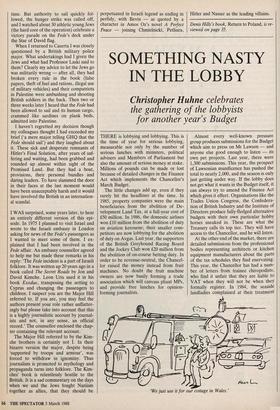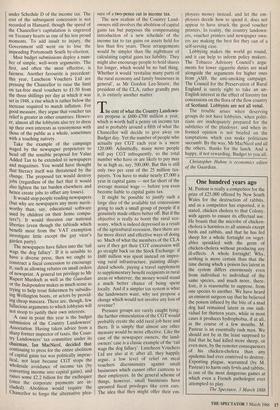SOMETHING NASTY IN THE LOBBY
Christopher Huhne celebrates
the gathering of the lobbyists for another year's Budget
THERE is lobbying and lobbying. This is the time of year for serious lobbying, measurable not only by the number of serious lunches with ministers, political advisers and Members of Parliament but also the amount of serious money at stake. Millions of pounds can be made or lost because of detailed changes in the Finance Act which implements the Chancellor's March Budget.
The little changes add up, even if they rarely hit the headlines at the time. In 1985, property companies were the main beneficiaries from the abolition of De- velopment Land Tax, at a full-year cost of £50 million. In 1986, the domestic airlines won £10 million from the abolition of duty on aviation kerosene; their smaller com- petitors are now lobbying for the abolition of duty on Avgas. Last year, the supporters of the British Greyhound Racing Board and the Jockey Club won £20 million from the abolition of on-course betting duty. In order to be revenue-neutral, the Chancel- lor raised the money instead from fruit machines. No doubt the fruit machine owners are now busily forming a trade association which will canvass pliant MPs, and provide free lunches for opinion- forming journalists. Almost every well-known pressure group produces submissions for the Budget which aim to press on Mr Lawson — and anyone else good enough to listen — its own pet projects. Last year, there were 1,300 submissions. This year, the prospect of Lawsonian munificence has pushed the total to nearly 2,000, and the season is only just getting under way. If the lobby does not get what it wants in the Budget itself, it can always try to amend the Finance Act which gives it effect. Organisations like the Trades Union Congress, the Confedera- tion of British Industry and the Institute of Directors produce fully-fledged alternative budgets with their own particular hobby horses sneaked in. These are what the Treasury calls its top tier. They will have access to the Chancellor, and he will listen.
At the other end of the market, there are detailed submissions from the professional bodies representing architects or kitchen equipment manufacturers about the parts of the tax schedules they find enervating- This year, the Chancellor has had a num- ber of letters from trainee chiropodists, who find it unfair that they are liable to VAT when they will not be when they formally register. In 1984, the seaside landladies complained at their treatment `We just use it for our cottage in Wales.' under Schedule D of the income tax. The cost of the subsequent concession is not recorded in Hansard, though the speed of the Chancellor's capitulation is engraved on Treasury hearts as one of his less proud moments. To add insult to injury, the Government still went on to lose the impending Portsmouth South by-election. Most budget submissions deploy a num- ber of simple, well-worn arguments. The first, and often the most effective, is fairness. Another favourite is precedent: this year, Luncheon Vouchers Ltd are pressing the Chancellor to raise the limit on tax-free meal vouchers to £1.50 from the three shillings per day at which it was set in 1948, a rise which is rather below the increase required to match inflation. For good measure, they argue that voucher tax relief is greater in other countries. Howev- er, almost all the lobbyists also try to dress up their own interests as synonymous with those of the public as a whole, sometimes with a touching naivety. Take the example of the campaign waged by the newspaper proprietors to head off the sensible proposal for Value Added Tax to be extended to newspapers and magazines. You would have thought that literacy itself was threatened by the change. The proposed tax would destroy jobs (regardless of the fact that it would also lighten the tax burden elsewhere and hence create jobs to offset any losses). It would stop people reading newspapers (but why are newspapers any more merit- worthy than, say, educational software used by children on their home compu- ters?). It would threaten our national liberties (even though the tabloids which benefit most from the VAT exemption investigate little except the gay vicar's garden party).
The newspapers have fallen into the 'tail wags the dog fallacy'. If it is sensible to have a diverse press, then we ought to construct a fiscal concession to encourage it, such as allowing rebates on small orders of newsprint. A general tax privilege to Mr Rupert Murdoch as well as the Guardian or the Independent makes as much sense as trying to help trout fishermen by subsidis- ing Wellington boots, or actors by provid- ing cheap mascara. There are, though, few fallacious arguments to which lobbyists will not stoop to justify their own interests. A case in point this year is the budget submission of the Country Landowners' Association. Having taken advice from a sharp former inspector of taxes, the Coun- try Landowners' tax committee under its chairman, Ian MacNicol, decided that continuing to press for the entire abolition Of capital gains tax was politically imprac- tical, not least because CGT stops the wholesale avoidance of income tax (by converting income into capital gains), and raises some £2.2 billion for the exchequer (once the corporate payments are in- cluded). Abolition would require the Chancellor to forgo the alternative plea-
sure of a two-pence cut in income tax.
The new realism of the Country Land- owners still involves the abolition of capital gains tax but purposes the compensating introduction of a new schedule of the income tax to tax gains on assets held for less than five years. These arrangements would be simpler than the nightmare of calculating capital gains tax liability. They might also encourage people to hold shares for longer, which would be no bad thing. Whether it would 'revitalise many parts of the rural economy and family businesses in general', as Mr Gordon Lee-Steere, the president of the CLA, rather grandly puts it, is entirely another matter.
The cost of what the Country Landown- ers propose is f600–£700 million a year, which is worth half a penny on income tax and is probably around a fifth of what the Chancellor will decide to give aivay on Budget day. Yet the number of people who actually pay CGT each year is a mere 120,000. Admittedly, many more people will pay CGT infrequently, so the total number who have or are likely to pay may be as high as, say, 500,000. But this is still only two per cent of the 25 million tax- payers. You have to make nearly £7,000 a year in capital gains — not far short of the average manual wage — before you even become liable to capital gains tax.
It might be possible to justify such a large slice of the available tax concessions going to such a small group of people if it genuinely made others better off. But if the objective is really to boost the rural eco- nomy, which is indeed depressed as a result of the agricultural recession, then there are far more direct and effective ways of doing so. Much of what the members of the CLA save if they get their CGT concession will go straight back on the Stock Exchange: if £600 million was spent instead on impro- ving rural infrastructure, painting dilapi- dated schools, paying a travel supplement to supplementary benefit recipients in rural areas or whatever, the money would stand a much better chance of being spent locally. And if a simpler tax system is what the landowners want, why not propose a change which would not involve any loss of revenue?
Pressure groups are rarely caught lying: the further emasculation of the CGT would probably create the odd rural job here and there. It is simply that almost any other measure would be more effective. Like the case of the newspaper owners, the land- owners' case is a classic example of the 'tail wags the dog fallacy'. Luncheon Vouchers Ltd are also at it: after all, they happily argue, a low level of relief on meal vouchers discriminates against small businesses which cannot offer canteens to their employees. In the general scheme of things, however, small businesses have sprouted fiscal privileges like corn ears. The idea that they might offer their em-
ployees money instead, and let the em- ployees decide how to spend it, does not appear to have struck the good voucher printers. In reality, the country landown- ers, voucher printers and newspaper own- ers are making the best fist they can of a self-serving case.
Lobbying makes the world go round, and it can help to inform policy makers. The Tobacco Advisory Council's argu- ments for lower cigarette duties are read alongside the arguments for higher ones from ASH, the anti-smoking campaign. The Council for the Preservation of Rural England is surely right to take an un- English interest in the effect of forestry tax concessions on the flora of the flow country of Scotland. Lobbyists are not all venal.
The trouble arises when deserving groups do not have lobbyists, when politi- cians are inadequately prepared for the subtleties of the plaidoyer, and when in- formed opinion is not briefed on the temptations which can make politicians succumb. By the way, Mr MacNicol and all the others, thanks for the lunch. And a happy, if not rewarding, Budget to you all.
Christopher Huhne is economics editor of the Guardian.



















































 Previous page
Previous page